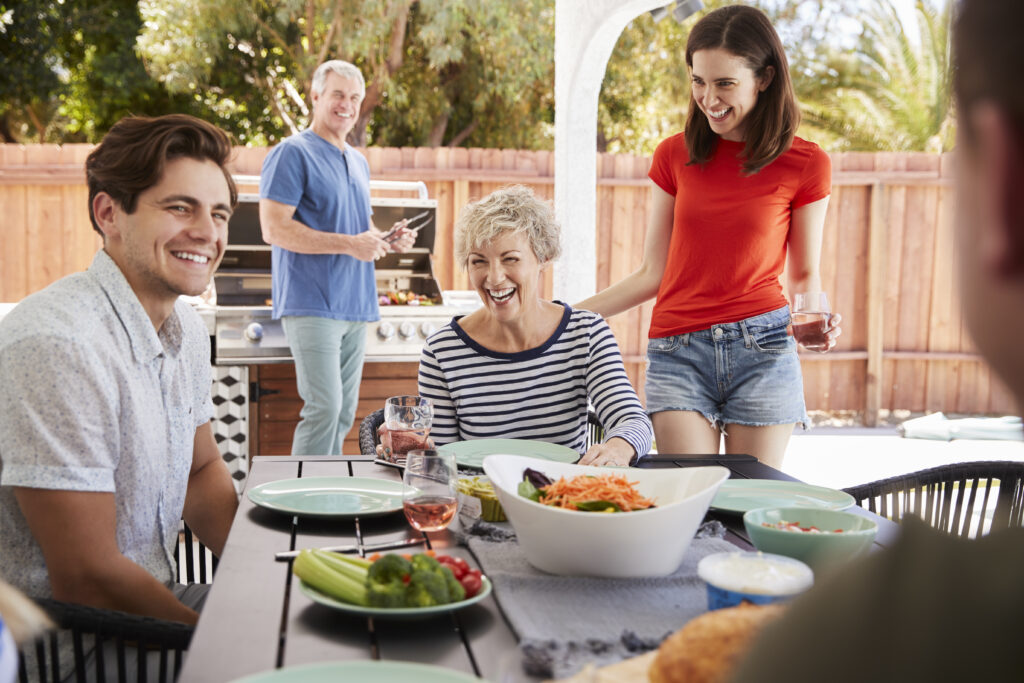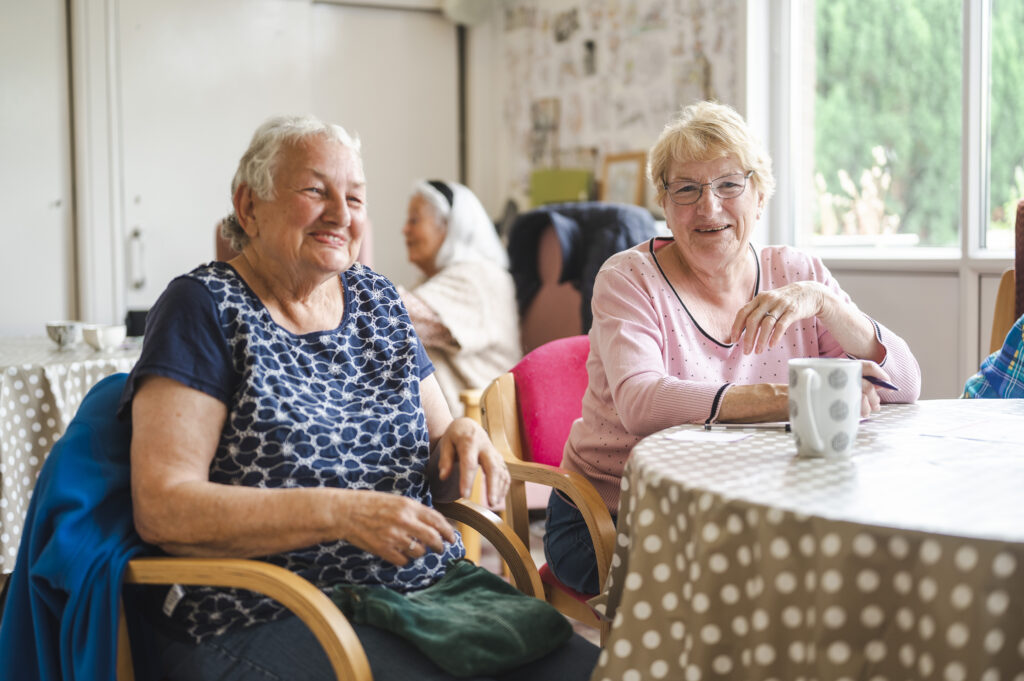
Food in social context
Food and our relationship with it continually changes throughout our lives. Sometimes, what we need from our food changes, and at other times, it’s about how certain foods make us feel at that time. Studies have found that women often try harder than men to avoid foods they think are ‘bad’. Women also worry more about food choices.
Why is this? Well, society has certain ideas about how women should look, which can cause stress. The media often shows pictures of ‘perfect’ bodies, and this can make us feel we need to look that way too. This pressure can sometimes make us make not-so-good choices about what we eat.
As we grow older, there are many things that affect how we choose our food. Some of these reasons are because of what society expects or because of money matters. Other reasons have to do with changes our bodies go through as we age. Remembering these things can help us to be kinder to ourselves about the food choices we make.
Societal
Many things around us affect what we eat. Our traditions and culture often guide the foods we choose, helping us express who we are and how we belong. Our family and friends also have a big part in what we like to eat from when we are young. When we eat by ourselves, some studies have shown that we might choose different foods or amounts than when we eat with others.
Women, in particular, sometimes feel pressure to change what and how much they eat because of how they are portrayed in the media. Ads and shows might talk about ‘healthy’ or ‘low calorie’ foods and diets, or show certain body shapes as ideal. These messages can influence what we eat, even if we don’t always notice it.

Economic
Food prices can affect our ability to get the right nutrition. When healthy food is expensive, it’s tempting to buy cheaper, less nutritious options. How much money we make and where we live can make it easier or harder to find nutritious food. In fact, income makes the biggest difference in choices about what food we buy, according to a report by the OECD. This can lead to differences in our health.
Where we live can also make a difference in the food choices available to us. For example, if we live in rural or regional areas where there aren’t as many choices for food shopping, or in areas that don’t have good transport options, it can be hard to find good food.
Individual

As we get older, many things can change the way we feel about food. We might not feel as hungry, or the foods we once loved might taste different. Our mental wellbeing (how we feel inside), stress, and what we believe about food can also affect our food choices.
As we age, going out to buy groceries might be harder if walking becomes tough or if we can’t drive. But if you are in that position, don’t worry – there are helpful services like Meals on Wheels, which deliver affordable meals to your home, to make sure you stay healthy and get to enjoy good, nutritious food.
There is also the federal government’s Commonwealth Home Support Program, which can help with preparing meals in your own home. This is just one of the ways they can help you to stay independent in your home (and for more on this topic, read our section on Independence).
Arthritis Australia (2017) Healthy eating
Australian Human Rights Commission (n.d.) Chapter 4: The role and influence of the media
Bärebring L, Palmqvist, M, Winkvist, A et al. (2020) Gender differences in perceived food healthiness and food avoidance in a Swedish population-based survey: a cross sectional study. Nutrition Journal
Bernstein M (2017) Nutritional needs of the older adult. Physical Medicine and Rehabilitation Clinics of North America. 28(4), 747-766
Better Health (2017) Nutrition needs when you’re over 65
Butterfly (2023) Body pride resources
Butterfly (2023) Boosting body image
Butterfly (2023) Health not weight
Butterfly (2023) LGBTQIA+ people, eating disorders and body image
Butterfly (2023) People from multicultural communities
Cameron E, Ward P, Mandville-Anstey SA, Coombs A (2018) The female ageing body: A systematic review of female perspectives on aging, health, and body image. Journal of Women and Ageing. 31(1): 3-17
Carrard I, Rothen S, Rodgers RF. (2020) Body image and disordered eating in older women: A tripartite sociocultural model. Eating Behaviours. 38(101412)
Carrard I, Rothen S. (2020) Factors associated with disordered eating behaviours and attitudes in older women. Eating and Weight Disorders – Studies on Anorexia, Bulimia and Obesity. 25: 567-575
Eat for Health (nd) Healthy eating when you're older
Eating Disorders Families Australia (2022) What is HAES?
Eating Disorders Victoria (2022) Eating disorders explained
Feel Good Eating (2021) What is HAES?
Hanna KL, Collins PF (2015) Relationship between living alone and food and nutrient intake. Nutrition Review 73(9), 594–611
Health Direct (2023) Risk checker
Hofmeier S, Runfola C, Sala M, Gagne D, Brownley K, Bulik C. (2017) Body image, ageing and identity in women over 50: The gender and body image (GABI) study. Journal of Women and Ageing. 29(1): 3-14
Kilpela LS, Becker CB, Wesley N, Stewart T. (2015). Body image in adult women: Moving beyond the younger years. Advances in Eating Disorders. 3(2): 144-164
My Aged Care (2023) Meals and food preparation
National Council on Ageing (2021) How to stay hydrated for better health
Nutrition Australia. (2021) Nutrition and older adults
Placzek O (2021) Socio-economic and demographic aspects of food security and nutrition. OECD Food, Agriculture and Fisheries Papers
Pontzer H, Yamada Y, Sagayama H, Ainslie P, Andersen LF, Anderson LJ, et al. (2021) Daily energy expenditure through the human life course. Science 373(6556): 808-812
ReachOut (2023) Support services for eating disorders
Samuels KL, Maine MM, Tantillo M (2019) Disordered eating, eating disorders, and body image in midlife and older women. Current Psychiatry Reports. 21(70)
Silva TR, Oppermann K, Reis FM, Spritzer PM (2021) Nutrition in menopausal women: A narrative review. Nutrients. 13(7)
Transhub (2021) Body image
Wallace TC, Bailey RL, Blumberg JB, Burton-Freeman B, Chen O, Crowe-White KM, et al. (2019) Fruits, vegetables, and health: A comprehensive narrative, umbrella review of the science and recommendations for enhanced public policy to improve intake. Critical Reviews in Food Science and Nutrition. 60(13)
Yeung SSY, Kwan M, Woo J (2021) Healthy diet for healthy ageing. Nutrients 13(12)





